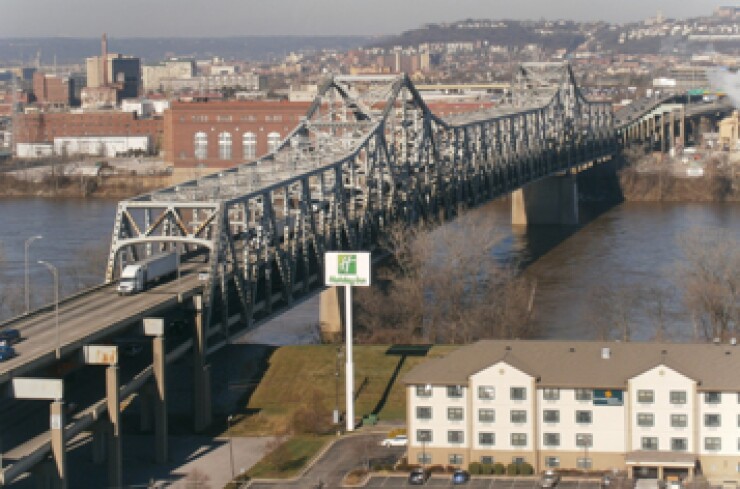
BRADENTON, Fla. - A Kentucky House committee moved to block the use of innovative financing and tolls for the $3.5 billion Brent Spence Bridge project.
The Appropriations and Revenue Committee Tuesday approved its version of the governor's recommended highway plan, deleting provisions allowing tolls and new finance structures for the plan to upgrade the bridge linking Cincinnati and its Kentucky suburbs across the Ohio River.
The committee's action followed Monday's passage by the full House of House Bill 407, which adopts an expansive bill authorizing public-private partnerships, tolling, and the use of revenue bonds for project financing.
However, HB 407 was amended prior to the vote to specifically ban tolls on projects between the state and Ohio, which also impacts the Brent Spence project.
The highway plan now goes to the full House for a vote, while HB 407 goes to the Senate.
Rep. Arnold Simpson, D-Covington, sponsored the HB 407 amendment prohibiting the use of tolls as part of a development agreement or finance plan for any project involving the federal interstate highway system that connects the Commonwealth with Ohio.
The 50-year-old "functionally obsolete" and congested double-deck Brent Spence Bridge carries Interstate 75 across the Ohio River from Covington, Ky., to Cincinnati. Plans are to build a new double-deck bridge alongside the existing bridge, which will be rehabilitated and reconfigured.
Simpson could not immediately be reached for comment, though he and a number of local elected officials in northern Kentucky, along with Tea Party activists, have long objected to the use of tolls in their region.
While the bill authorizes tolls in other areas of the state, Simpson told the Enquirer that he wants to see what impacts occur from the tolled Ohio River Bridges project between Louisville and Indiana. That project won't open for another two years.
Along with banning tolls on the Brent Spence, HB 407 also states that any proposed public-private partnership for the project must be ratified by the General Assembly.
Gov. Steve Beshear and Transportation Secretary Mike Hancock have said that the Brent Spence Project "cannot be done in any foreseeable period without toll revenue," said Kentucky Transportation Cabinet spokesman Chuck Wolfe, who added that the legislation - if passed as amended - would "appear to be a setback" for the project.
Wolfe did not know if a private partner would develop the project without toll revenue, but he said, "A private partner obviously would need a guaranteed revenue stream, whatever its source."
Kentucky and Ohio transportation planners working on the Brent Spence project envision using a P3 largely because of the limited availability of current and future federal funding, they said in a preliminary finance plan submitted to the Federal Highway Administration in January.
"At existing funding levels, constructing the project would absorb both states' entire major new funding capacity for several years," the plan said. "Therefore, alternative delivery and funding options, including tolling, are necessary to ensure the project is built in the foreseeable future."
The finance plan also said that Ohio had spent or encumbered $68.1 million for the Brent Spence venture, and already had necessary authorizations for using a P3.
The plan said Kentucky has spent or encumbered $20.9 million on the project, but moving it forward was dependent on legislation authorizing tolls and the use of a P3 for financing. The legislative session runs through mid-April.
The Brent Spence Bridge opened to traffic in 1963, and was designed to carry 80,000 vehicles per day. It currently handles about 160,000 vehicles daily, and traffic is projected to increase to more than 230,000 vehicles per day by 2035.





